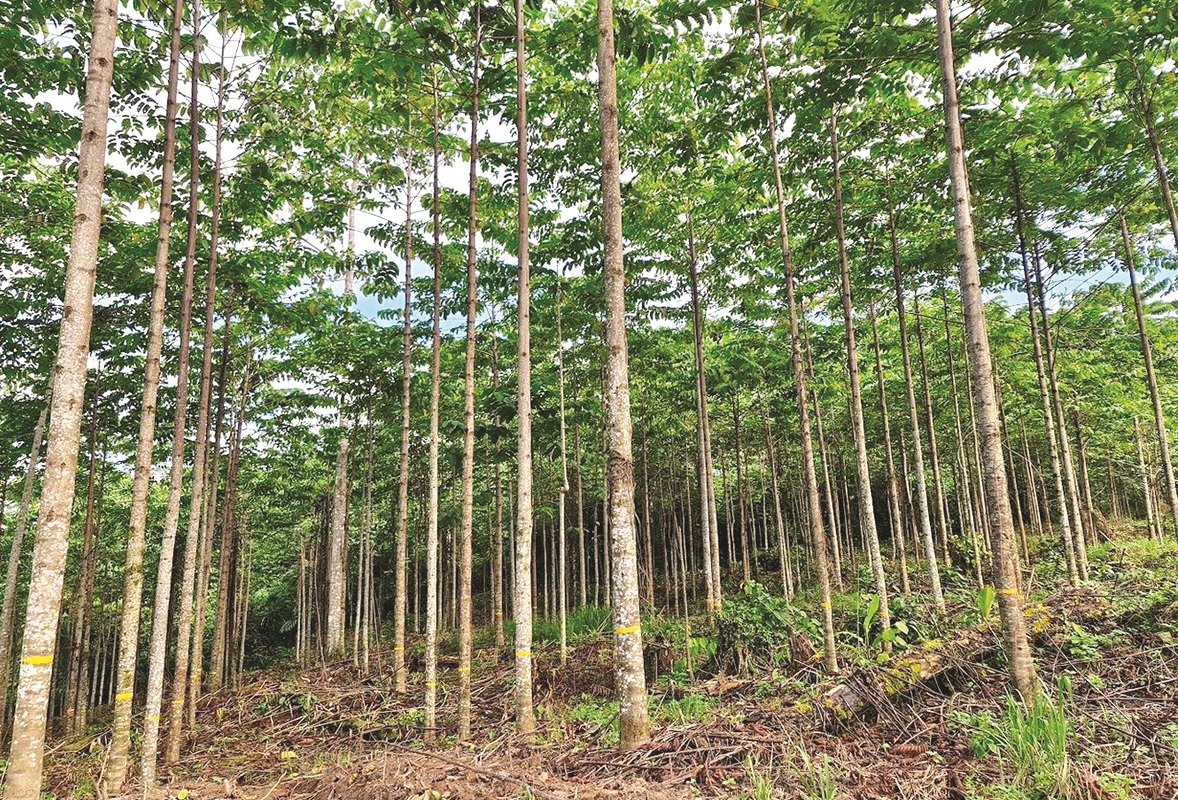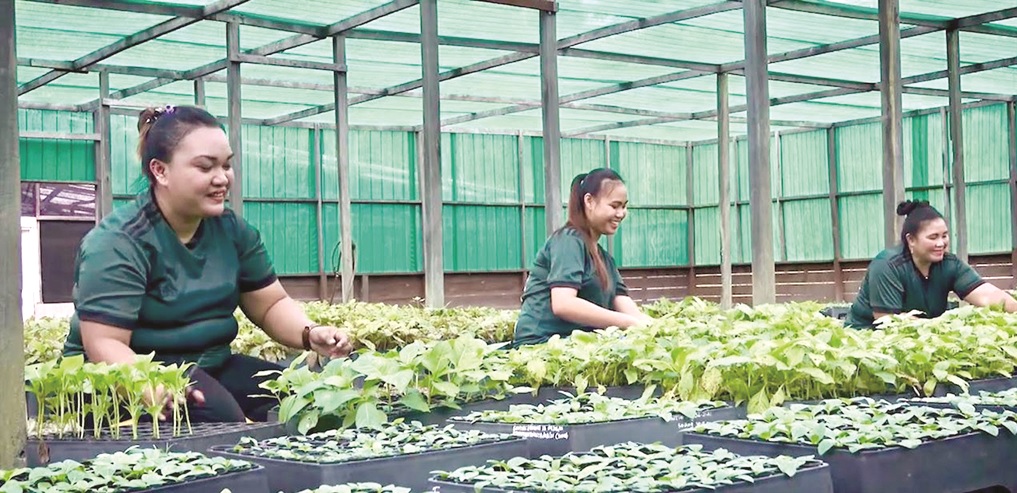

Serious call to develop Sabah’s furniture ecosystem
Published on: Sunday, March 17, 2024
By: Kan Yaw Chong
Text Size:

Rubberwood furniture produced by Jaycorp in West Malaysia.
MALAYSIA made a whopping RM25 billion from all wood products in 2022, out of which Sabah’s cut was a lowly RM1.2b or a mere 4pc of the national share.
How come? One quick answer is, West Malaysia has a flourishing, well-developed and high value-added downstream furniture manufacturing infrastructure while Sabah hardly has a downstream ecosystem.
Here are the salient numbers for Sabah to think about while it is targeting 400,000ha of forest plantations fully planted by 2036, in quest of becoming a key wood producer again.
“Malaysia produced 6 million cubic metres of logs in 2022, West Malaysia, Sabah and Sarawak combined,” noted statistics-savvy Rahman Khan, Group CEO of Jawala Inc and Jawala Plantaton Industries Sdn Bhd.
“The revenues from this log production was RM25 billion,” he said.
“Of that, Sabah produced 1.2 million cubic metres of logs but what was the value of Sabah’s logs – only RM1.2 billion or a mere 4pc!”
“What is the conversion?” Rahman asked.

Laran and Albizia wood products from Jawala’s various R&D trials in Sabah.
“For every cubic metre of logs Malaysia produced, the final value is RM4,160 per cubic metre from those logs but Sabah generated only RM960!” he highlighted the sharp contrast in terms of returns.
The natural question is ‘why’? “Furniture – downstream furniture manufacturing, because we in Sabah did not develop the infrastructure or the ecosystem for furniture manufacturing,” Rahman pointed out.
“You can see the difference is huge.”
“In West Malaysia, they have gone very much downstream producing big furniture high-value added products. We (Sabah) are still producing a little bit of mouldings, sawn timber,” he lamented.
Why furniture investment in West Malaysia enriched Jawala
Rahman can speak with authority on the difference between east and west since Jawala penetrated into the latter’s lucrative furniture manufacturing business 19 years ago and making very good money.
“It’s a good investment,” Rahman told Daily Express.
In 2022 alone, Jaycorp Berhad’s revenue hit RM306,601,000, Rahman shared.
What is Jaycorp Bhd? “We have two companies – the forest management and forest plantation company Jawala Inc which is listed in the Singapore Exchange and its associated company – Jaycorp furniture company of which Jawala Corporation is a substantial shareholder,” Rahman explained.
Jaycorp operates eight highly-automated factories located across West Malaysia in Sungei Rambai, Melaka and Batu Pahat. It has a component factory in Medan, Indonesia, which employs a total workforce of 4,000 including vendors – a major economic force indeed.
“Its yearly consumption of sawn rubber wood hits 60,000 to 80,000 cubic metres, translating into 320,000 cubic metres of Industrial Tree Plantation (TTP) rubber wood logs.
“Our total export earnings had contributed RM2.66 billion to the Malaysian economy over the last 10 years,” he noted.
“Jaycorp is also the highest dividend paying company on Bursa Malaysia over the last 10 years, according to The Edge News with an average dividend paying of 9.5pc per year.”
Sad Sabah has no support ecosystem
Here’s the intriguing point.
“Sad to say we have not been able to set up our furniture manufacturing, it’s been in production but here in Sabah we do not have the ecosystem to support a highly-automated rubber wood furniture manufacturing industry like that in West Malaysia,” he pointed out.
“In West Malaysia, you have a whole ecosystem in place. Actually, Malaysia is one of the Top 5 furniture producers in the world and ranked 10th in furniture exports.
“That’s because we owe all these benefits to the late Tun Dr Lim Keng Yaik, former Minister of Primary Industries who started the rubber wood furniture industry. But in Sabah we haven’t been able to, except for a few furniture companies that didn’t last, simply because we are not competitive,” Rahman noted.
Ecosystem and ‘just in time’
So what does Rahman mean by “ecosystem”, which he kept repeating?
“Ecosystem means for you to produce furniture, there are many other components that you need, such as upholstery, nails, resins, engineering staff because you have boilers, you have machinery but you have to be in a cluster,” he stressed.
“Nowadays we practice what we call a ‘just-in-time’ process where if I require upholstery, buy nails, I can just place an order and they will send them to me and they send me what I require, they don’t send me more than that.
“I don’t keep stock, I don’t keep inventory, and quality control is more effective when you practise ‘just-in-time’, so how come we don’t get it here (Sabah)?”
Sabah’s land cost a major stumbling block
What is the major obstacle?
“Number 1: Land cost,” Rahman noted.
“How much is land in KKIP? RM40. Bintulu is RM3.50, RM5.50, the Demak Laut Industrial Estate in Kuching – RM15. On the other hand, a piece of land in between Port Klang and KL, the land for sale in the year 2004 was only RM6 per sq ft, the factory, concreted land, water, electricity everything are there,” he pointed out.
“I believe the Selangor government paid the land for more than RM6, I am very sure the total development plus the land cost they must have spent a lot but when they opened it for sale, it’s RM6, what were they expecting, why were they doing it?
“I think it is about employment, export earnings, taxes, it’s an export oriented investment, I have no reasons to believe that the land in Bintulu is RM5.5/sq ft, the total development cost,” Rahman said.
Locating furniture hub in wrong place?
“On the other hand, during the previous State government (Warisan government), they wanted to do a furniture hub, they did it in Sandakan as part of the POIC estate, at RM22 per sq ft land cost.
“But what’s timber supply situation in Sandakan, there’s no logs in Sandakan, very little. My operation is in Supulut – so Sapulut and Kalabakan were sending logs to Sandakan, it has to depend on logs from Sapulut, Tawau, Kalabakan. So why should they put the furniture hub in Sandakan?” Rahman wondered about a setup that doesn’t square with the ‘just-in-time’ principle.
Fully developed ‘cluster’ of 1,000 factories
“In West Malaysia, when we do furniture, we would need screws, upholstery, we would need resins etc. You know, from Batu Pahat to Muar all the way up to Meleka, you have 1,000 factories there –with all the expertise.
“In Sabah, we have the resources, why don’t we have the expertise? If you want to develop the furniture industry, I honestly think it is the duty of the government to develop a cluster, spend money to develop the infrastructure, we have the resources. West Malaysia had set their mind into doing it. For Sabah, I think it’s the policies,” he asserted.
Hope: GRS serious & products from planted trees
But changing everything is still possible, given a serious government and leadership, Rahman said.
“One thing I am very pleased is that the current GRS government is very serious about developing forest plantations,” said Rahman who knows exactly what that means after a serious job at Jawala Forest plantation in Sapulut which beat a crowd of 84 companies to win the ‘Best Model Forest Plantation award’.
The global trend is clear.

Stately Laran trees planted in Jawala forest plantation in Sapulut.
“If you go anywhere around the world, forest plantation is the way forward for the timber,” said Rahman, citing Laran and Albizia wood products which Jawala Plantations had produced from its trees planted in the heart of Sabah, through various R&D trials in collaboration with UMS and some of its customers.
Substituting tropical logs underway
“What are these products?” he asked. “If you look at them, they are replacing and substituting tropical timber.”
“This is why I have a very strong belief that forest plantations will lead to greater conservancy, sustainability and renewability of Sabah’s resources,” Rahman argued, citing numbers from a two-hectare trial harvest in Oct 2023. It yielded 210.4c3 metres per ha of Albicia and 135c3 per ha Laran – seven times larger than the 30c3 perha of salvaged logs extracted from the degraded forests earmarked for planting industrial trees.
“When you have these, you don’t have to depend on your tropical forests anymore. You only depend on a very little bit, so with all the products from my planted forests which you see here (visited by Daily Express), I am very confident that we can achieve that level,” Rahman argued.
“But we don’t hear this narrative much.”
“Yet this is what people must understand: why do you develop forest plantations? We develop them to reduce the pressure on tropical forests, yes, but you need to go a step further – I grow forest plantations to replace and substitute the utilisation of tropical forests.”
Fast growing species to achieve purpose identified
“The public must understand we have done it already,” he reiterated.
“We have identified the fast growing species that match the varying densities of tropical timber from tropical forests, so how can we not replace and substitute logs from tropical forests?”
“For example, low, medium and high density wood from fast growing species such as Acacia Mangium and Eucalyptus Pellita have been identified as suitable to replace tropical timber for a wide range of applications from interior to structural panels.
“Their density range from 280 to 700kg per cubic metre,” he got down to density numbers.”
Most gladdening, the products are already selling.
“Integrated Wood Products Sdn Bhd (IWP) whom we have been working with to develop our ITP is already exporting 100pc plantation plywood and Laminated Veneer Lumber (LVL) to Japan and Europe from these species. Our R&D with IWP started back in 2022. Our first R&D was conducted with Focus Lumber and Kosinar Sdn Bhd back in 2020 with Laran from our first sample plots,” he said.
Regret – no spokesman on what is achievable
“Timber is used basically for applications in exterior and interior structures. For these uses, we have identified all the fast growing species which have almost similar densities, similar applications, I have been quite fired up while we were working on and developing all these, but I see nobody go out of their way to deliberate what is achievable, why and what are the benefits from all these,” Rahman noted.
“Not that we are very smart but because we have gone further downstream to manufacturing furniture, that’s why we can realise the potential, and I think we are the only group which have gone all the way downstream, all the way up to automated furniture manufacturing, we are Sabahans, but very sadly, we don’t have furniture operations here, the furniture operations are all in West Malaysia.”
Glad CM cracking the whip
“But policy wise, I am very happy this government is looking at it seriously, Chief Minister Hajiji is the only one who is putting a very strong focus on forest plantations, he is the only one who has emphasised very strongly the way forward is concessionaires given to the FMUs must plant.”
“In fact, he has cracked the whip and told them the government is watching, as he has made it part of the Sabah Maju Jaya development ever since he took over, this strong interest is very promising.
“If there is no strong interest from the CM, how are we going to win? In fact, he has even gone down to our plantation and also Sapulut Forests and we had a big do.”
“We have established a lot of committees through the Sabah Forestry Department, to seriously develop forest plantations and to move further down streams, the Conservator of Forests Fred Kugan personally chairs most of the meetings with us sitting there, we have very regular meetings with the Forestry Department, we all want to set up new policy on ITP.
"So although we maybe a little bit late but we are starting. So we are very serious, it’s a challenge, although forest plantations should have been developed a long time ago,” Rahman said.
Sabah can do it, with right infrastructures
“The world needs 3.3 million hectares of Timber plantations by 2050 to supply 3.1 billion cubic metres of wood demand.”
“Sabah targets to produce 6 to 8 million cubic metres of ITP logs annually from 400,000 hectares. If we can develop the right and necessary infrastructures to support and encourage Industrial Tree Plantation processing, we can replicate West Malaysia to create 260,000 jobs and generate RM24 to RM30 billion a year,” he said.
“On the Environmental, Social and Governance (ESG) pillar, I would like to be frank and make it clear that without profit there is no ESG,” Rahman said.
Incidentally, Dr John Tay is one of the ESG consultants for Jawala Plantation Industries especially on environment.

Rahman (left) and Dr Tay
“He did our High Conservation Value Assessment and Forestry Environmental related studies,” Rahman said.
Dr, Tay was instrumental in persuading Jawala to set aside 3,375ha or 31pc of its 11,043ha concession for high conservation which Rahman and his Chief Operation Officer, Maxy Self decided to accept, in favour of international recognition and credibility.
Dr Tay runs his own consultancy firm, Prime Forestry Consulting.
A word to the government
“The government must formulate policies and incentives to ensure long gestation business like ITP will be profitable. From Sook to Balabakan, there are virtually no or very little oil palm plantations and only forest plantations, it is we the FMUs who play our role to support and develop the communities through job opportunities,” Rahman pointed out.
“I can tell you that to improve the income of the rural people here you can do it with tree planting. Given the right economy of scale we can stimulate them and alleviate their income.
“In fact, what is the most pleasing thing I see over the last 6 years of going up and down with my family, we had to build garages because some of my workers who didn’t have cars in the beginning they can now afford to buy cars such as secondhand Kancil, Perdoua, some of the B40 couples can now earn up to RM4,600-RM4,800 a month, others take home RM4,000, some RM3,000, depending on their efforts but it can be done.”
Who says locals can’t work
“We have planted 1.3 million seedlings now over the last six years, produced by my beautiful Murut ladies.

Murut women tending to nursery work.
"People say locals can’t work, but I can bring them to my camp to show it’s not true, it depends on how you incentivise to get the best out of them, you prepare the right facilities, the right environment, you can bring out the best, we provide 24-hour solar power, I have generated 25MW of electricity over the last seven years, we have no SESB there, we provide gravity water from our water catchments in our high conservation value areas,” he pointed out the impact of ESG.
“For a small FMU like Jawala Plantation Industries Sdn Bhd, the CM has seen the infrastructures we have invested and the community development that we have done. We do take our ESG very seriously and would like the communities flourish.”
ADVERTISEMENT






